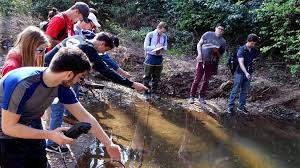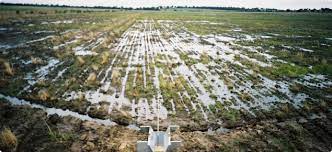Factors Controlling the Evaporation Process
Rates of evaporation vary, depending on meteorological factors and the nature of evaporating surface. If natural evaporation is viewed as an energy-exchange process, it can be demonstrated that radiation is by far the most important single factor and that the term solar evaporation is basically applicable.
On the other hand, theory and wind-tunnel experiments have shown that the rate of evaporation from water of specific temperature is proportional to wind speed and is highly dependent on the vapour pressure of the overlying air (Linsley et al, 1982).
How are these two conclusions to be reconciled? In essence, it can be said that water temperature is not independent of wind speed and vapour pressure. If radiation exchange and all other meteorological elements were to remain constant over a shallow lake for an appreciable time, the water temperature and the evaporation rate would become constant.
If the wind speed were then suddenly doubled, the evaporation rate would also double momentarily. This increased rate of evaporation would immediately begin to extract heat from the water at a more rapid rate than what could be replaced by radiation and conduction.
The water temperature would approach a new, lower equilibrium value, and evaporation would diminish accordingly (Linsley et al, 1982).
The nature of evaporating surface is another important factor in the evaporation process. All surfaces exposed to precipitation, such as vegetation, buildings, and paved streets, are potentially evaporation surfaces.
The rate of evaporation from a saturated soil surface is approximately the same as that from an adjacent water surface of the same temperature; as the soil begins to dry, evaporation decreases and its temperature rises to maintain the energy balance.
Eventually, evaporation virtually ceases, since there is no effective mechanism for transporting water from appreciable depths. Thus the rate of evaporation from soil surfaces is limited by the availability of water, or evaporation opportunity.

Evaporation from snow and ice constitute a special problem since the melting point lies within the range of temperatures normally experienced.
Read Also : Factors Influencing Soil Moisture
Evaporation can occur only when the vapour pressure of the air is less than that of the snow surface i.e., only when the dew point is lower than temperature of the snow. It should be noted that only foreign material which tends to seal the water surface or change its vapour pressure or albedo will affect the evaporation.
In summary, the above discussions revealed that evaporation process is mainly dependent on an energy source (sun) and wind-which is necessary to mix the water molecules with the air and transport them away from the surface.
Without evaporation, the hydrologic cycle processes will be incomplete, with serious implications on precipitation, which would have adverse effects on plants, animals and human lives.
Evaporation is the process by which a liquid is converted into a gaseous state; while transpiration involves water lost from plants. The combine process is called evapotranspiration.
Rates of evaporation vary, depending on meteorological factors and the nature of the evaporating surface. Evaporation pans and lysimeters are the common instruments used in measuring evaporation and evapotranspiration respectively.



